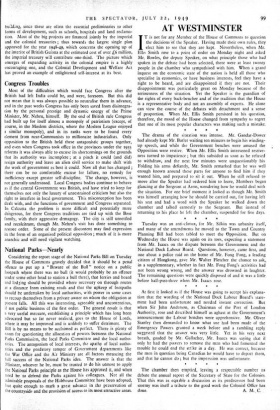Congress Troubles
Most of the difficulties which would face Congress after the British had left India could be, and were, foreseen. But this did not mean that it was always possible to neutralise them in advance, and in the past weeks Congress has only been saved from disintegra- tion by the personal prestige and dynamic energy of the Prime Minister, Mr. Nehru, himself. By the end of British rule Congress had built up for itself almost a monopoly of patriotism (except, of course, in the Moslem districts, where the Moslem League enjoyed a similar monopoly), and in its ranks were to be found every clement from near-Communists to millionaire industrialists. Only opposition to the Brnish held these antagonistic groups together, and even when Congress took office in the provinces under the 1935 reforms it was always able to excuse its shortcomings on the grounds that its authority was incomplete ; at a pinch it could (and did) resign authority and leave an alien civil service to make shift with the work of government as best it could. Now all that has changed ; there can be no comfortable excuse for failure, no remedy for inefficiency except greater self-discipline. The change, however, is not generally understood. Local Congress bodies continue to behave as if the central Government was British, and have tried to keep for themselves not only the luxury of unrestrained criticism but also the right to interfere in local government. This misconception has been dealt with, and the functions of government and Congress separated. In Calcutta the problem is more difficult and potentially more dangerous, for there Congress traditions arc tied up with the Bose family, with their aggressive demagogy. The city is still unsettled and recalcitrant, though Mr. Nehru's visit has done something to restore order. Some of the present discontent may find expression in the form of an organised political opposition ; much of it is more anarchic and will need vigilant watching.


































 Previous page
Previous page